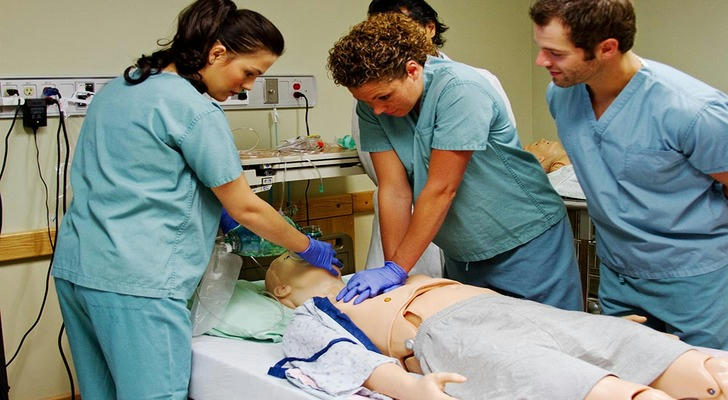Essential Skills Every Nurse Should Learn in Nursing School

Nursing is a rewarding and challenging profession that requires a blend of technical knowledge, hands-on practice, and compassionate care. Nurses play a critical role in the healthcare system, from providing direct patient care to working alongside doctors and other healthcare professionals to develop treatment plans. To succeed in this dynamic field, every nurse must acquire a core set of skills during their nursing school training. These skills not only shape how nurses interact with patients but also contribute to their ability to make informed decisions in high-pressure environments.
1: Patient Care and Bedside Manner.
Nurses are often the first healthcare professionals patients encounter in hospitals, clinics, and other healthcare settings. Therefore, building strong patient care skills is essential. A nurse's ability to establish rapport with patients can significantly affect their recovery and overall experience.
Key Elements of Patient Care:
• Active Listening: Patients often need someone who will listen to their concerns. Nurses must be able to listen carefully, understand patient needs, and communicate effectively.
• Empathy: Being compassionate and empathetic helps build trust, allowing patients to feel more comfortable discussing their symptoms and concerns.
• Patient Advocacy: Nurses should know how to act as patient advocates, ensuring that the patient’s preferences and concerns are considered in their treatment plan.
In a 2018 study by the National Institutes of Health (NIH), it was found that nurses who excelled in patient care and had strong bedside manners were linked to higher patient satisfaction scores and better health outcomes.
2: Clinical Skills: Taking Vital Signs and Administering Medication.
Clinical skills are the foundation of nursing practice. Nurses must be adept at performing various tasks that help monitor and treat patients.
Key Clinical Skills:
• Taking Vital Signs: Nurses need to accurately measure vital signs such as temperature, pulse, blood pressure, and respiratory rate. These readings provide crucial information about a patient’s health status.
• Administering Medication: Nurses are responsible for administering medications, ensuring the correct dosage, and monitoring for side effects. This requires a deep understanding of pharmacology and patient safety protocols.
According to the American Association of Colleges of Nursing (AACN), students spend a significant portion of their education learning clinical skills, with practical sessions in simulation labs and real healthcare environments. Proficiency in these areas helps prevent medical errors and ensures the safe care of patients.

3: Critical Thinking and Problem-Solving.
Nurses are often required to make quick decisions in high-pressure situations, whether they’re responding to a patient in distress or managing multiple patients with complex conditions. Critical thinking is an essential skill that helps nurses assess situations, make informed decisions, and solve problems effectively.
Key Aspects of Critical Thinking:
• Assessment Skills: Nurses need to gather detailed information, conduct physical exams, and assess patient conditions through observation and diagnostic tests.
• Prioritization: Nurses must prioritize tasks based on urgency and severity. This skill is crucial when managing several patients at once or dealing with emergencies.
• Problem-Solving: Nurses should be able to identify issues and come up with solutions, especially when patients' conditions worsen or unexpected complications arise.
According to the National League for Nursing (NLN), nurses with strong critical thinking skills tend to achieve better patient outcomes, reduce errors, and improve efficiency in healthcare settings.
4: Communication Skills: Interacting with Patients and Team Members.
Effective communication is key in nursing. Nurses need to communicate clearly and professionally with both patients and other healthcare professionals. Good communication ensures that patient care is coordinated, and the needs of the patient are fully understood.
** Communication with Patients:**
• Explaining Procedures: Nurses must explain medical procedures, treatment options, and medication regimens in a way that patients can understand, making them feel more at ease.
• Emotional Support: Providing emotional support to patients, especially those facing serious illness or injury, is part of a nurse's role. It helps reduce anxiety and fosters a sense of trust.
Communication with Team Members:
• Collaborating with Doctors and Healthcare Staff: Nurses are essential members of the healthcare team. Strong communication ensures seamless collaboration and patient care continuity.
• Documentation: Nursesare responsible for documenting patient information accurately and efficiently. This ensures that the patient’s history and treatment plans are properly recorded and accessible to the team.
A 2019 study published in the Journal of Nursing Education found that effective communication was linked to better patient outcomes, as it minimizes misunderstandings and enhances the coordination of care.
5: Time Management and Organization.
In a fast-paced healthcare environment, time management and organization are crucial. Nurses often juggle multiple tasks, such as administering medications, performing assessments, and providing emotional support—all within a set time frame.
Time Management Tips:
• Task Prioritization: Nurses must be able to prioritize tasks based on urgency. For example, a patient experiencing a heart attack requires immediate attention, while routine assessments can be scheduled for later in the shift.
• Multitasking: Nurses should be able to manage various tasks at once, ensuring that patient care remains the priority.
According to a study by the American Nurses Association (ANA), nurses who effectively manage their time and stay organized reduce stress, enhance job satisfaction, and improve patient care.

Conclusion:
Nursing school is not just about memorizing medical facts; it’s about developing essential skills that will help nurses excel in the healthcare field. From patient care and clinical expertise to critical thinking and communication, these core competencies are crucial in providing high-quality care. As the healthcare landscape evolves, nurses who master these skills will be better equipped to navigate the complexities of patient care and contribute positively to patient outcomes.
By focusing on these key areas, nursing students can lay a solid foundation for their careers and ensure that they’re prepared to handle the challenges and rewards of the profession.
